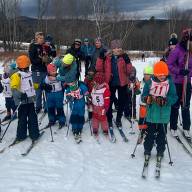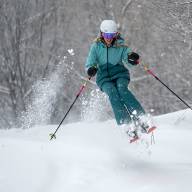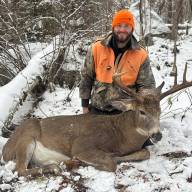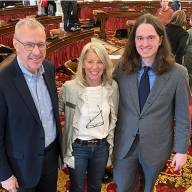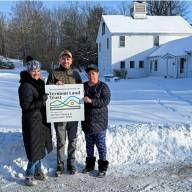Join American Flatbread at Lareau Farm and Forest for its fortieth anniversary community fest on Thursday, August 14 from 5:00 to 9:00 p.m. American Flatbread and the Schenks celebrate forty- years of food and community. The celebration features free flatbread, music and a bonfire.
When George Schenk baked his first flatbread into a wood-fired stone oven at his Warren home, in the spring of 1985, he wasn’t thinking about building a business.
“I just wanted to say thank you,” he recalled, seated beside his wife whose name is Mary, who goes by George or Girl George.
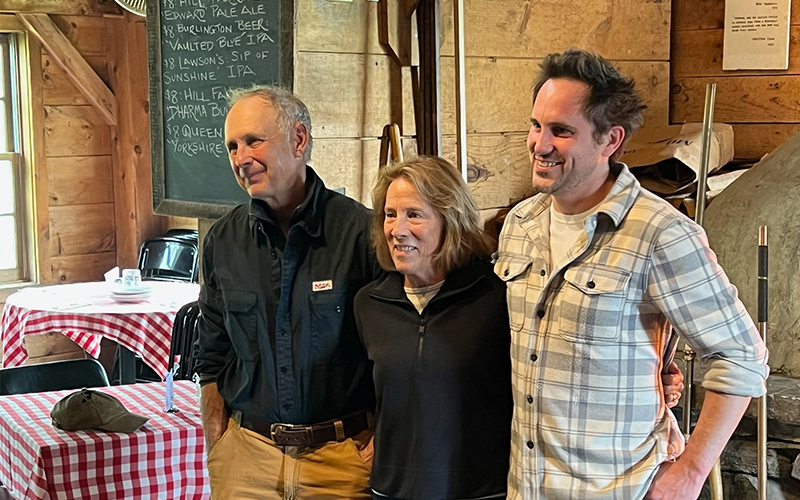
“It was just dinner for friends,” he said, in this case Lyndon and Joanne Virkler. Lyndon Virker was the chef at the former Sam Rupert’s restaurant in Warren where Schenk had been working and he wanted to feed his friends something to show his appreciation.
What started as dinner for friends became, over the next four decades, one of The Valley’s most notable attractions, a sought-after meal at a unique (and cold in the early days) locale that garnered long lines on weekends throughout the year. And it also became a different kind of success and one that evolved along with the business. Before socially conscious businesses were a thing, the Schenks were creating one.
Over the years and through various iterations, they’ve instituted and maintain programs that give back to the community and feed hungry and sick kids in hospitals. They partnered with local schools, baking pizzas and featuring student artwork on their walls. They’ve pioneered using local and organic ingredients, forging relationships and connections with local farmers and providers and moving increasingly into their own farming and gardening.
But that evening in 1985, George was serving up a creation he’d concocted in a somewhat primitive stone oven he’d built on his property.
“I was originally trying to build a bread oven,” Schenk said. “But I didn’t know how to make a door. So, I thought, maybe if the bread is flat, it won’t be as affected by the drafts.”
|
Join American Flatbread at Lareau Farm and Forest for its fortieth anniversary community fest on Thursday, August 14 from 5:00 to 9:00 p.m. American Flatbread and the Schenks celebrate forty- years of food and community. The celebration features free flatbread, music and a bonfire. |
He baked the flatbread with olive oil, garlic, herbs from the garden, and a sprinkle of Parmesan. Using an egg spatula in place of a pizza peel, Schenk served the flatbread to his three guests. “We each took a bite, and the smile went around the circle like a wave at a stadium,” he said. “I realized I’d made something I really liked.”
That first flatbread became their future – one that was defined by food, but also by sustainability, community, simplicity, and fire.
KITCHEN CAREER BEGAN
Schenk’s kitchen career began as a dishwasher at Sam Rupert’S which is where he met Girl George in the early 1980s. At Sam Rupert’s he was promoted to appetizer cook and then moved to Tucker Hill in Fayston where he worked for Chef Gary Danko and developed a passion for cooking with fire and with local food.
Schenk had been continuing to tinker with flatbreads, making them for friends, and experimenting with ovens, including portable ones. A major breakthrough was participating in The Taste of The Valley event in 1985 which led to rave media reviews and piqued more peoples’ interest in sampling the creation. At Tucker Hill, Schenk proposed building a more permanent oven on the patio and there American Flatbread was served once a week.
“The first night we did 21 people,” he said. “Week two, only 11. But I realized I could define success on my own terms.”
From there, word spread fast. Diners waited on the stairs, bypassing the formal dining room upstairs. “One woman looked at me and said, ‘He’s like a caveman,’” Girl George laughed. “There he was, crouched on the ground, burning the hair off his arms with a little spatula.”
The flatbread night eventually expanded to two evenings per week. “There’s one moment I’ll never forget,” Girl George said. “We had our baby in a backpack. George was working the oven, and I looked up and saw the moon rising. There was firelight, the smell of bread, and I just felt happy – deeply happy.”
In 1988, seeking winter viability, Schenk designed a hybrid longhouse-style shelter inspired by Native American architecture. Volunteers helped him build it from maple saplings and canvas. “We baked all winter long,” he said.
NEW SPACE
The couple juggled parenting, careers, and community as American Flatbread gained a following. In 1992 the oven at Tucker Hill collapsed due to a frost heave and that marked the end of their time there and led them to move completely to a new space they’d found at the Lareau Farm in Waitsfield.
They’d begun producing frozen flatbreads for retails sales at that time and that operation was at the Lareau Farm while the restaurant was still at Tucker Hill. The frost heave accelerated their move to the Lareau Farm, which at the time offered dining in what was still basically a barn and slaughterhouse heated primarily by the wood-fired ovens. Many folks will remember eating there, wrapped up in coats and hats, taking off gloves and mittens to eat.
“Around then, Ben & Jerry’s invited us to vend at their One World One Heart Festival. I saw this as a way to get their attention for possible distribution of our frozen breads. It worked,” Schenk said.
That led to a frozen flatbread enterprise that by 2005 was producing 14,000 frozen flatbreads a week with a staff of 104. Demand grew and franchise requests came in. The first real franchise launched in 1998 in Amesbury, MA, by a skier who loved the food and wanted to bring good food to his community – a guiding value for future franchise interest.
MAJOR SHIFT
The 2008 recession triggered a major shift. The frozen market crashed, losing 50% of its share in six months. The franchise model also proved problematic with franchisees wanting a formula, not values-based flexibility. Seeking simplicity, the Schenks divested themselves of the frozen business and franchising, focusing specifically on relocalizing themselves and their business.
“Around 2010, the business shifted significantly. We sold Middlebury and exited the frozen and franchising divisions. It became clear we were better at hospitality than at building a corporate model. At one point, I got swept up in the idea of expanding endlessly and getting rich, but I realized I was chasing someone else’s dream. What I truly wanted was health, happiness, and community,” Schenk said.
Letting go of frozen flatbreads and franchising freed up energy to reinvest locally. That led to more gardening, farming, and a lifestyle focused on community. American Flatbread regularly hosts community events, holds community benefit bakes, hosts community art shows, Christmas tree sales, a free produce kiosk and more. Weddings are part of the business and are often booked out a year in advance. Local hikers and bikers access recreational trails from the Lareau Farm and Forest.
“We re-centered our efforts at Lareau Farm, building the restaurant and growing the farm, “George Schenk said. And it’s still about cooking food over fire.
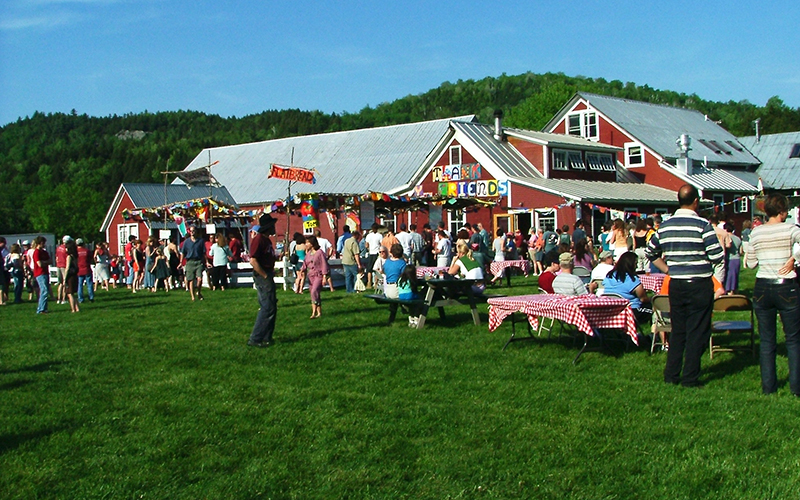
Schenk said. “Cooking over fire is ancient – it’s in our DNA. It brings people together. And if you can do that with clean, honest ingredients, all the better.”
Hospitality is still hard work. COVID made it even harder, shifting us to takeout and thinning our staff,” Girl George said. Their son Willis joined the business with them during COVID.
“Though we’re older now, retirement isn't clear-cut. The gardens have become my retirement project, even if I work dawn to dusk. We still watch our finances, but the goal isn’t wealth – it’s a life we’re glad to be part of, George Schenk added.




